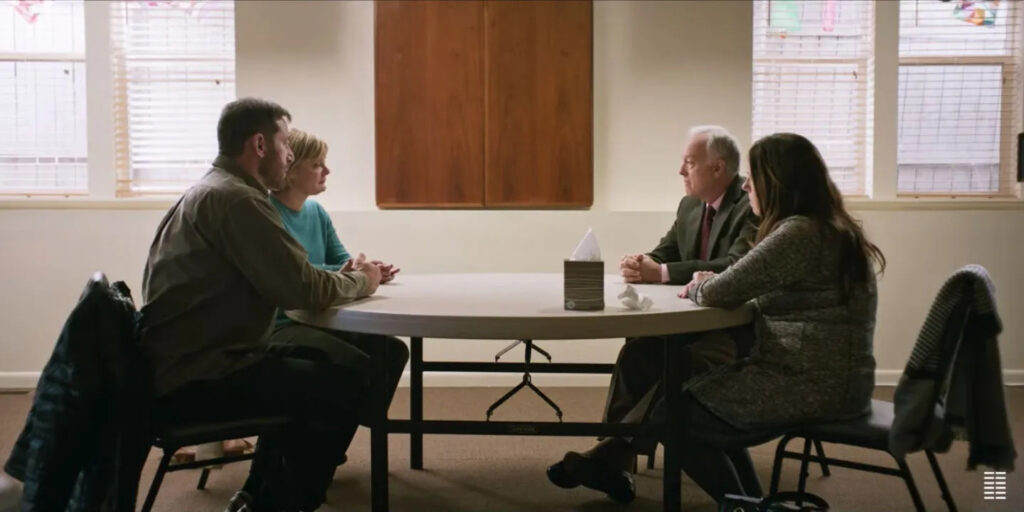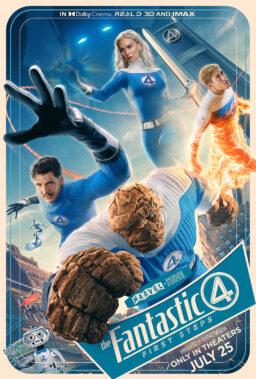“Mass” takes a while to let us know what is, bringing its four main characters together for a conversation in a church meeting room. The first film written and directed by actor Fran Kranz builds its momentum slowly, making it all the more powerful when we understand that these four parents have experienced an unthinkable tragedy. In interviews, Kranz and two of the film’s stars, Jason Isaacs (Jay) and Ann Dowd (Linda), talked about the movie’s depiction of grief and forgiveness.
Fran, I was very interested your framing device, with a woman preparing the room for a meeting we do not know anything about. But we can tell from her nervousness that it is going to be a sensitive one.
FRAN KRANZ: I wanted people helping people. Somehow that was always in my head. It was the first thing I ever wrote. I sat down and I wrote that opening in one sitting. It was longer than what you see in the film. But the notion was that people organize these things, people help people, and I thought that was a wonderful thing that the film needed.
Also, on top of that, I felt if the movie was just the four parents, and that was it, and it was a true four-hander, I believed that audiences would go into a theater, and they would feel safe. They would feel like they were watching fiction. They would be less affected by the story if it was just the four parents. I believe that if you have introduced the story by way of people that have not experienced this kind of unimaginable tragedy, including ordinary people, people like a lot of us, that it would be a subtle way of entering this story, to be more blindsided and more affected by what the four parents bring into it. If we start the film with almost quirky or almost goofy characters, there are intentional laughs at the beginning. I’m trying to make them comfortable with this world and present it as ordinary, and real, and not a threat. And so, when the parents arrive by contrast you are hit with the devastation of what’s happened in their lives. I really believe that these people make the film that much more impactful with their ordinariness.
There is a young man working at the church, but we subtly see that the woman is helping him more than being helped by him.
FK: This is the character of Anthony, played by Kagan Albright, who’s great in the film. The movie is about young men in many ways, and he’s a surrogate young man in the film. There’s this notion that maybe there’s something going on with this kid. And to that point, there are also other lines where no one’s really paying attention to him. He makes a comment and it’s brushed off by the mediator.

One core theme of the film is the way people grieve differently, and the way those differences can result in feelings of anger and isolation.
FK: Yes, everyone handles it differently. And in many ways, the film is about that, about how we live with grief, and how we can heal or potentially move forward, but how it never really leaves you, you just live with it differently. I’ve never written a screenplay before. The only way I really knew how to go about doing it was as an actor. I would try to put myself in each of these characters’ shoes, and work through this conversation as I believed one would have to from that perspective. The four perspectives being as a father of a shooter, the mother of a shooter, father of the victim, and the mother of the victim. I never sat down beforehand and said or decided, this is how they all are going to behave and this is going to be their journey. It happened organically in trying to write it out. For example, I read about families sharing photos, and so I started a scene trying to figure out what that might be. I read about a certain loophole in gun legislation, and then I’d improvise a scene about how the characters might speak about that. The way they each individually process grief came about naturally.
ANN DOWD: When one’s life breaks to the degree that Linda’s life has broken, meaning the loss of her boy and that he took the lives of others and caused so much grief, she is going to think, “As his mother, what did I miss, and how did I miss it?” I think once life breaks to that extent, she knows and accepts that it will never, ever be what it was or anything resembling it. And I think because she accepts it, because her life shattered so profoundly, what went with that was all her defenses. She made the decision not to put any walls up anymore. There is no point. I think her gift is that she accepted it, dropped into it and left the pieces on the ground, and just knew she would live with this grief this way until it naturally shifted and allowed her to put one foot in front of another. And so, she has no defensives, she is receptive, she listens.
And what she brings to the room is a wish, a desire to help in whatever way to ease some of the pain, and she just does it with the truth, without any excuses for anything.
JASON ISAACS: Jay is no longer about feeling pain. For him, it’s about effecting change. He comes in, brimming with thoughts about psychopathology and legislation, and he is mostly there to manage his wife who he thinks is emotionally damaged. Their joint therapy has led them to this place. But of course, he’s in complete denial about the personal stuff that he’s buried a long time ago. That’s why it’s a beautiful script. That’s why it unfolds like a great symphony. Great drama is when a character says something they think, they mean something else, and the audience are perfectly well aware there’s a third driving subterranean force and current that the character is completely unaware of that has to erupt. And sure enough, all those things come to pass in this encounter.

Because we know so little about what is going on and who the characters are at first, we form much of our early impression from what they have chosen to wear to this meeting. What do they tell us?
AD: Her clothes show us she has no need to hide, cover, pretend, none of it. “This is the dress that I’m comfortable in.” I think her hygiene is good, and she leaves it there. It’s interesting. When my father died when I was 18, what struck me most was that there was no shield or filter about what was important to me; it was as clear and real as anything ever was. I was raised in a Catholic family, so that means generally, there is going to be a wake, and the casket will be open. And I remember walking in, and my father’s best friend and my mother were trying to choose what he was going to wear, and I looked at my mother and I said, “What do you mean? This is not going to be an open casket, what could you be thinking?” I was so stunned, and she looked to me and she said, “Well, your dad would want it this way, honey.” For Linda, all the extraneous is nonsense and she is “No, no, nope.”
JI: He’s got his padded jacket. He wants to wear something that makes him feel really comfortable. When he goes to Washington advocates, lobbies, and activists he will dress up. But in this particular instance, he wants to say, “I am comfortable. I am at home, I am myself, I don’t need to change.”

Has working on this movie made you think differently about forgiveness in your own life?
JI: Yes. I work on behalf of refugees, and I come across appalling racism, selfishness, and lack of compassion and empathy and I feel a lot of hate, a lot of blame. But the hatred and blame that I carry has no effect on the world or the people that I’d like to change or the people that I’d like to help and all it does is mess me up. Oh, yeah, this movie absolutely did that. I embody it perfectly. It’s a wake-up call. It’s part of the continual reminders we need.
FK: Yes. So much of this came about by being inspired by the Truth and Reconciliation Commission in South Africa. When I was in college, I first learned about that, and what was happening over there, what had happened. And at that time, I was honestly disturbed because I did not believe I could do that. I watched, and read, and learned about families of victims forgiving the perpetrator, and I did not think I could do it. It terrified me.
And 20 years later, after the Parkland shooting, and I’m listening to this parent on the radio, I had to pull over I was so overwhelmed. I was a new parent myself, and I went back to those feelings. What would I do? How could I move forward? Could I ever heal? And that’s what got me into the research and got me into reading about this and thinking about this. It was rooted way back in my life, this fear that I could not forgive.
And so, I think so much of the motivation, and the obsession and the dedication to this was working through those feelings. The movie is essentially that. It’s a meditation, on forgiveness. My own meditation on forgiveness, and healing, and reconciliation, and how do we do it? Is it possible? Are there better ways to reconcile than just forgiving? Does it work equally for each party? Does it benefit each party? Is there a transactional aspect to it? These are all things that really fascinated me. But I also believed what Desmond Tutu said—it’s the title of his book, There Is No Future Without Forgiveness. That holding on to hate and holding on to resentment imprisons you.
I think we know these things implicitly, and I think we’ve normalized now in this country hating people we don’t even know. We just lived through this intense period of blame, and I feel this desperate need for healing and reparation of relationships. And so, yes, I’d like to believe it. I’d like to believe in the power of my own forgiveness or the capability of forgiveness, but it’s hard. And I am absolutely not trying to tell victims or survivors, you should forgive or this is what you do. This is just my own personal expression and way of working through those fears and desires.
“Mass” is now playing in select theaters.












